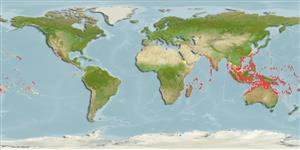>
Kurtiformes (Nurseryfishes, cardinalfishes.) >
Apogonidae (Cardinalfishes) > Pseudamiinae
Etymology: Pseudamia: Greek, pseudes = false + Greek, amia = a kind of shark (Ref. 45335).
More on author: Smith.
Environment: milieu / climate zone / depth range / distribution range
Ekologi
laut berasosiasi dengan karang; kisaran kedalaman 1 - 64 m (Ref. 526), usually 1 - 40 m (Ref. 37816). Tropical; 30°N - 30°S
Indo-Pacific: Red Sea and East Africa to French Polynesia, north to Ryukyu Islands, south to Sydney Harbor, New South Wales (Australia). Not yet reported from the Persian Gulf, India, Malaysia, Lord Howe Island, Hawaiian Islands, Marquesas Islands, Pitcairn Group, and Easter Island (Ref. 526). Recently recorded from India (Ref. 45255).
Size / Weight / umur
Maturity: Lm ? range ? - ? cm
Max length : 11.0 cm TL jantan/; (Ref. 48635)
Duri punggung (Keseluruhan (total)): 7; duri punggung lunak (Keseluruhan (total)): 8; Duri dubur 2; Sirip dubur lunak: 8; vertebrata, bertulang belakang: 24. This species is distinguished by the following characters: dorsal fin rays VI-I, 9; anal fin rays II, 8; pectoral fin rays 15; pelvic fin rays I, 5; pored lateral line scales 35; predorsal scales 5-6; circumpeduncular scales 12; total gill rakers 11, developed gill rakers 8 (Ref. 093839); body translucent when fresh; sides and ventral part of head light golden to silvery iridescent; head and body with large brown spots with golden dot on the center; dusky peritoneum with numerous black dots. Anterior nostril with long, darkly pigmented membranous flap. Dorsal part of caudal fin sometimes with an indistinct dark spot. 39-43 scales in longitudinal series. This species has fewer gill rakers and anal fin rays than P. amblyuroptera (Ref. 37816).
Inhabits protected bays and lagoon reefs. Lives deep in coral thickets, thus is seldom seen by day (mainly nocturnal). Solitary (Ref 90102).
Distinct pairing during courtship and spawning (Ref. 205).
Randall, J.E., E.A. Lachner and T.H. Fraser, 1985. Revision of the Indo-Pacific apogonid fish genus Pseudamia, with descriptions of three new species. Indo-Pac. Fish. 6:1-23. (Ref. 526)
Status IUCN Red List (Ref. 130435)
ancaman kepada manusia
Harmless
penggunaan manusia
informasi lanjut
AcuanBudidaya airprofil budidaya airStrainGenetikaElectrophoresesDiturunkanPenyakit-penyakitPengolahanNutrientsMass conversion
mitraGambarStamps, Coins Misc.Suara-suaraCiguateraKecepatanTipe renangArea insangOtolithsOtakPenglihatan / visi
Alat, peralatan
laporan khas
muat turun XML
Sumber internet
Estimates based on models
Preferred temperature (Ref.
123201): 24.7 - 29, mean 27.6 °C (based on 1302 cells).
Phylogenetic diversity index (Ref.
82804): PD
50 = 0.5078 [Uniqueness, from 0.5 = low to 2.0 = high].
Bayesian length-weight: a=0.00389 (0.00180 - 0.00842), b=3.12 (2.94 - 3.30), in cm total length, based on all LWR estimates for this body shape (Ref.
93245).
Trophic level (Ref.
69278): 3.5 ±0.5 se; based on size and trophs of closest relatives
Daya lenting (Ref.
120179): Tinggi, Waktu penggandaan populasi minimum kurang dari 15 bulan (Preliminary K or Fecundity.).
Fishing Vulnerability (Ref.
59153): Low vulnerability (10 of 100).
Nutrients (Ref.
124155): Calcium = 150 [79, 251] mg/100g; Iron = 0.919 [0.538, 1.554] mg/100g; Protein = 18.6 [17.4, 19.6] %; Omega3 = 0.114 [0.065, 0.208] g/100g; Selenium = 37.7 [18.0, 80.9] μg/100g; VitaminA = 82.5 [26.7, 245.2] μg/100g; Zinc = 1.88 [1.22, 2.75] mg/100g (wet weight);
